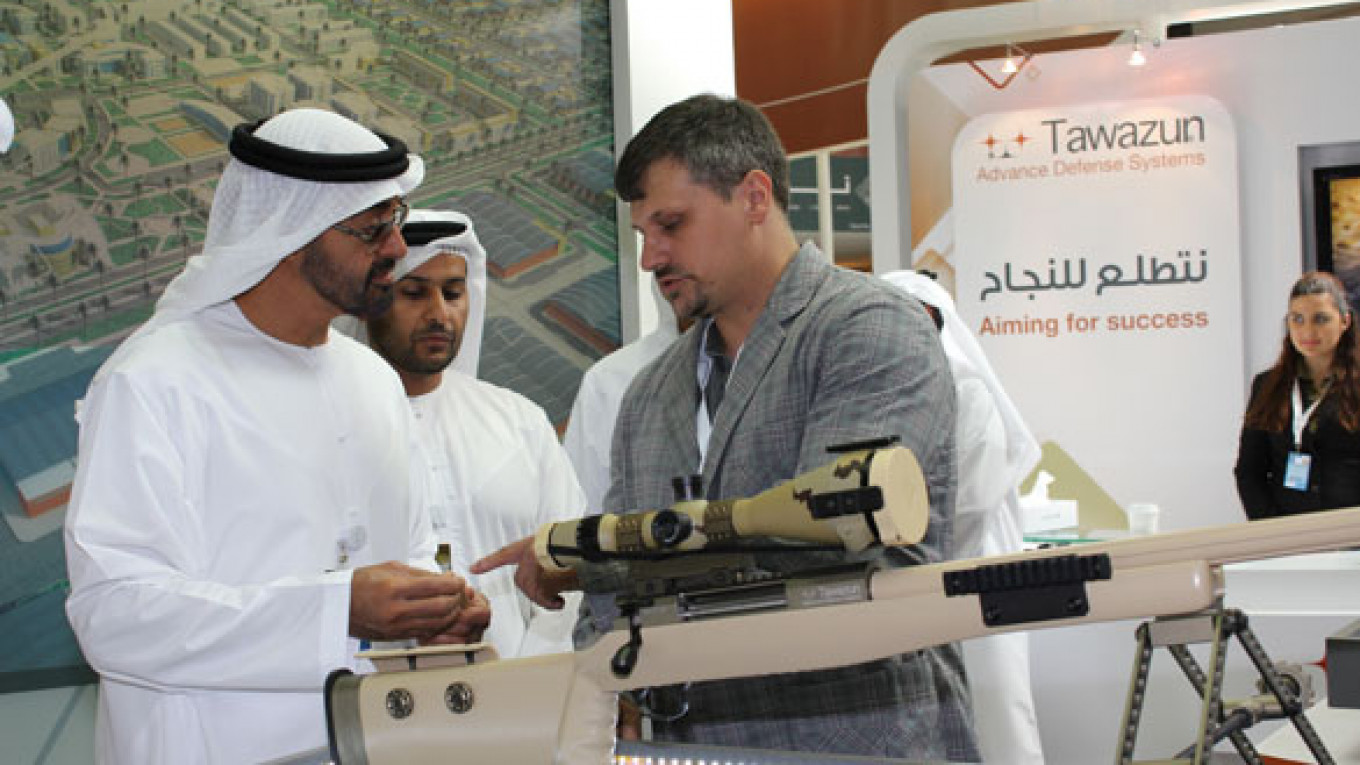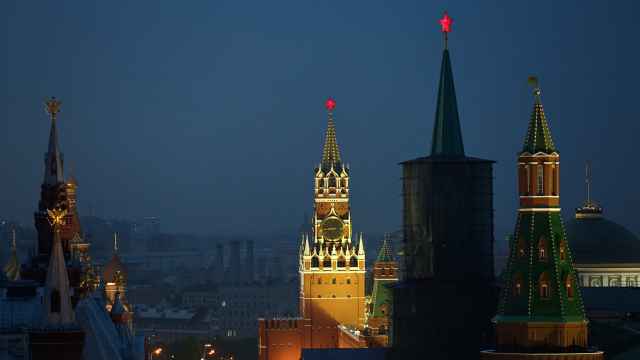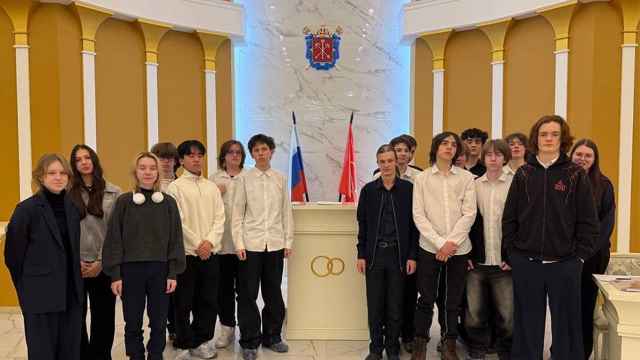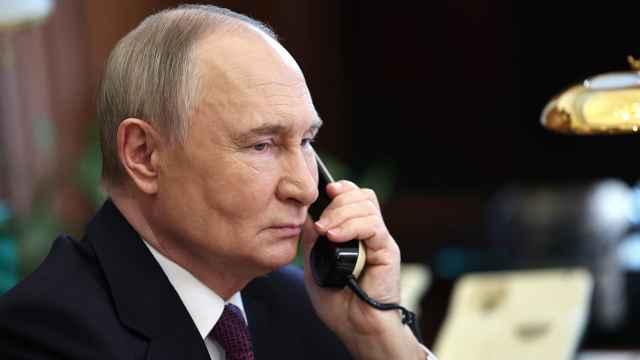DUBAI, United Arab Emirates — One rifle maker's products will be absent at the national firearms laboratory that Deputy Prime Minister Dmitry Rogozin announced would begin operations soon to help provide best-in-class weaponry to Russia's armed forces.
Although his sniper rifles were purchased by the Federal Guard Service, the agency responsible for the security of Russia's president, even the highest-level contacts didn't help protect Vladislav Lobayev's Tsar Pushka.
The company, which was the first private weapons maker in post-Soviet Russia, closed its plant outside Moscow, and its founder moved to the United Arab Emirates in August 2010, after unsuccessfully trying to renew his operating license.
"Our rifle was very much in demand: All our customers appreciated our products. If Tsar Pushka was still in business in Russia now, we could reach a volume of 1,000 rifles a year," Lobayev said in an interview in Dubai.
Prime Minister Vladimir Putin's military manifesto published in February 2012 clearly states the need for private enterprise to get involved in making military hardware, but Lobayev found the bureaucratic hassle too great.
Like many educated people after the breakup of the Soviet Union, Lobayev wound up in 1996 using his philosophy degree from Moscow State University in his role as a manager at a private detective company.
While in the United States on a business trip, he got a chance to participate in an arms-training exercise with a police department. It was then he "got hooked" on bench resting, a term used to describe the high-precision sport of sniper rifle shooting. Lobayev won a top prize at the very first international bench-resting competition he attended.
He went on to study weapons manufacturing with industry leaders in the United States. He learned sniper rifle design and engineering from a well-known weapons maker named Speedy Gonzalez and later on mastered production aspects under Clay Spencer — from whom he purchased his first manufacturing equipment.
Sniper Startup
Lobayev spent several years getting the license from the Industry and Trade Ministry to become the only private weapons maker in the country. To start his venture, he borrowed about $3 million, and even had to sell two of his Moscow apartments to pay the debt.
Tsar Pushka, named in honor of the larger than life monument to cannons at the Kremlin, began operations in 2002 in the Moscow region town of Podolsk. In 2007, Lobayev acquired a bigger facility in Tarusa, 145 kilometers from Moscow, and moved his manufacturing of custom-made, long-range, high-precision rifles there.
Lobayev's masterpiece was a 0.408-inch caliber sniper rifle known to the market as the SVL-0.408, where SVL stood for snaiperskaya vintovka Lobayeva. It could hit a target three kilometers away with an accuracy of 0.3 angular minutes, putting it in the same league as leading competitors made in the United States and Britain. There was no weapon equal to the SVL being made in Russia or Europe.
Though a small-scale operation compared to traditional state-owned gun-making behemoths like the Izhevsk Machine Building Factory, or Izhmash, Lobayev was able to keep up with his niche market's demand. Sales and accolades grew.
In the 2008 Europe bench-resting championship, Russian sportsman Igor Zhukov won two gold medals with an SVL.
"The Federal Guard Service bought my rifles," Lobayev said. He also counted among his clientele Russian, Kazakh and Armenian intelligence agencies.
The company made 80 rifles in 2009 and hit sales of 20 million rubles ($660,000), with a plan to double the turnover in 2010.
A Minor Detail
But in April 2010, the Russian Industry and Trade Ministry did not extend Tsar Pushka's manufacturing license. Lobayev said he received no official explanation.
Tsar Pushka applied for the license extension in early spring 2010. By April of that year, the company received a response from the ministry.
"First we received a reply with a squabble over some minor paperwork detail. We corrected it and resubmitted the application again. We waited until the time frame was over — no reply came," Lobayev said. "Meanwhile we had shipments to make, export orders to deliver. And there we were, sitting in limbo, not knowing what we were to do: shut everything down, walk away?"
The firm had successfully passed a review that month by the Industry and Trade Ministry's special compliance commission, which came to the plant and checked that the manufacturing equipment, raw materials and finished goods have all the necessary certifications, meet quality standards and that all required procedures are followed.
"The people in the commission even admitted that everything in Tsar Pushka was perfect, and they named some people and structures that were behind the initiative to find a reason to kick us out of the market", Lobayev said.
Leveraging Contacts
But he still was not willing to give up.
Tsar Pushka used different channels to try to resolve its dilemma, mainly asking customers, such as the Federal Guard Service and the Federal Security Service, as well as other well-connected clients, to facilitate the license extension.
The company waited until June, but when no reply came from the ministry and all the informal lobbying that Lobayev had done through clients and contacts yielded no result, he wrote a letter to the Presidential Administration asking for help. There was no response.
"We started to receive threats to leave the business or to end up behind bars," Lobayev said, though he refused to disclose the names of the people who threatened him. He said he believed that those who were putting obstacles in his way included old market players and new entrants.
Under hostile pressure and with an expired license, Tsar Pushka was forced to stop operations.
The Industry and Trade Ministry said in a statement sent to The Moscow Times that "it was Lobayev's Tsar Pushka who asked the ministry to return all the licensing documents due to the fact that it had decided to stop production of sniper's rifles."
Lobayev confirmed that such a request to cancel the license was sent, but this was in September 2010, after Lobayev had already given up and left for Dubai. The letter was written by a person temporarily left in charge to close down the business.
When asked why he didn't appeal to the Russian legal system to help resolve his problem with the ministry, Lobayev said, "You know, it yields the same effect as pissing against the wind."
Valuable Market
With the exit of Tsar Pushka from the scene, local and foreign sniper rifle suppliers began to fill the niche. Historically, Soviet Army sniper troops had been supplied with the Dragunov rifle, made by Izhmash, which has a range of about 800 meters.
A television program critical of the Dragunov rifle and complimentary of the SVL aired on a regional station in July 2011. It claimed that the number of victims in the 2008 South Ossetian military conflict could have been greatly reduced had Russian sniper forces used the SVL instead of the less advanced weaponry.
Another local player in the sniper rifle business is TsNIITochmash, which makes weapons covering the 400- to 800-meter range. These rifles have been sold to the Defense Ministry and the Interior Ministry's special forces.
Austria's Steyr Mannlicher last year won a contract to supply the Russian Defense Ministry with its sniper rifles, though the exact models have not been disclosed.
About 5 months after Lobayev's departure from Russia, Promtekhnologii, a new private sniper rifle manufacturer, appeared on the market. Located in Moscow, it was co-founded by Mikhail Abyzov, who is also chairman of the board of holding Ru-Com and an adviser to President Dmitry Medvedev.
Until recently, Alexei Rogozin — the son of Deputy Prime Minister Dmitry Rogozin, who is tasked with oversight of the military industrial complex — was a deputy director of the firm. The younger Rogozin resigned from his position there in February 2012.
In August 2011, Promtekhnologii started sales of the Orsis T-5000 rifle, which has a range of 1,500 meters and is being promoted as the leading sniper rifle made in Russia, with its sights set on supplying state customers.
"The Orsis T-5000 model can replace weapons that are now in use by the special task forces. The company is in contact with the Defense Ministry about potential contracts," Alexei Sorokin, general director of Promtekhnologii, said in an earlier interview with The Moscow Times.
A source in February confirmed that the Federal Security Service and the Federal Guard Service, both former Tsar Pushka customers, have started purchasing Orsis T-5000 sniper rifles.
Promtekhnologii did not respond to a request for comments for this article.
Beyond political and business ramifications, scalability could have been an issue for Lobayev.
"The fact that the Federal Security Service was one of his customers, indicates that his product was of a quite high quality," said Igor Korotchenko, chief editor of National Defense magazine, "but his rifles were custom-made. I think his departure had to do with better business opportunities in the Emirates. But such a market segment could not have remained unfilled: His niche was taken by Promtekhnologii, which has a larger manufacturing capacity."
Officials at Izhmash and TsNIITochmash promised to comment for this article, but by Thursday neither had replied to written inquiries submitted two weeks earlier.
Setting Up Far Away
In the midst of all his troubles, Lobayev got a helping hand: A high-ranking delegation came to Russia to visit Lobayev's company in April 2010 on behalf of UAE President Sheikh Khalifa bin Zayed Al Nahyan.
The UAE officials told Lobayev that they wanted to test his rifles, as they had just returned from the United States and were not satisfied with the test results of rifles they saw there.
"The delegation saw that my rifle exceeded their expectations," Lobayev said.
The delegation from Dubai proposed that a local UAE holding company and Lobayev form a joint venture, now known as Tawazun Advanced Defense Systems, or TADS, part of the Tawazun Group Holding, based in Zayed Military City near Abu Dhabi.
"I simply sold my brand and my knowledge," Lobayev said. He has a 40 percent stake in the new venture where he works as a senior manager. The company is engaged in research and development and manufacturing of advanced defense systems, including a new sniper rifle designed by Lobayev called the TADS-KL 11.
Lobayev has also helped several of his former staff to relocate to Dubai with their families. "We have got such a highly qualified team here now that it allows us to find solutions to very complex tasks," he said.
Although he thinks business decisions are made slowly in the Emirates, he appreciates the safe environment.
"I can just simply go to work, perform my duties and not worry about what can happen, whether someone will come and take something away from me or my business, have me framed or put in jail," he said.
Though he is pleased with his new business away, Lobayev is still bitter about his experience in Russia.
"I wanted to serve and be of use to my own country. But you cannot put your head against the wall and keep pushing it," he said. "Sooner or later you get tired of it."
A Message from The Moscow Times:
Dear readers,
We are facing unprecedented challenges. Russia's Prosecutor General's Office has designated The Moscow Times as an "undesirable" organization, criminalizing our work and putting our staff at risk of prosecution. This follows our earlier unjust labeling as a "foreign agent."
These actions are direct attempts to silence independent journalism in Russia. The authorities claim our work "discredits the decisions of the Russian leadership." We see things differently: we strive to provide accurate, unbiased reporting on Russia.
We, the journalists of The Moscow Times, refuse to be silenced. But to continue our work, we need your help.
Your support, no matter how small, makes a world of difference. If you can, please support us monthly starting from just $2. It's quick to set up, and every contribution makes a significant impact.
By supporting The Moscow Times, you're defending open, independent journalism in the face of repression. Thank you for standing with us.
Remind me later.






